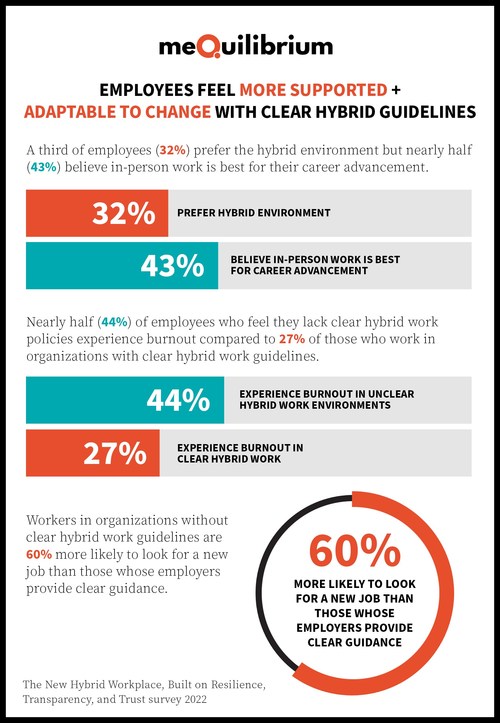A Third of Employees Prefer Hybrid Work Environment but Many Feel In-Person Work Is Better for Career Advancement
Despite embracing new remote and hybrid work, employees fear being left behind in career advancement if they are not working onsite. A third of employees (32%) prefer the hybrid environment but nearly half (43%) believe in-person work is best for their career advancement. That’s according to a new survey of 912 full-time U.S. workers, “The New Hybrid Workplace, Built on Resilience, Transparency, and Trust,” co-authored by Jan Bruce (meQuilibrium) and Jeanne Meister (Executive Networks).
“It is no longer true that being physically present in the office results in more opportunities for career advancement, as the past two years of remote and hybrid work have shown,” said Jeanne Meister, Executive Vice President, Executive Networks. “For those employees working hybrid or remotely, the avenues for increasing their visibility within the organization are not always clear-cut.”
HR Technology News: Avetta’s Workforce Management Solution Provides the Most Comprehensive Way for Supply Chains to Ensure the Safety of Their Projects and Workers
HR policies have largely focused on supporting on-site workers, because they traditionally have comprised the majority of the workforce. In fact, before the pandemic, only 6% of those employed worked primarily remotely and about three quarters of workers had never worked remotely, according to NCCI. But as more employees experience the value and flexibility of hybrid work, leaders must re-imagine the business landscape and communicate these changes to every employee.
Well-defined policies and providing adequate support for all work environments can enhance employee morale and retention. The New Hybrid Workplace survey found that a majority of business leaders (66%) said their organization has well-defined hybrid work policies, however, less than half (47%) of employees agree.
Poor communication and lack of employee support can have serious consequences, including burnout and intent to quit. Nearly half (44%) of employees who feel they lack clear hybrid work policies experience burnout compared to 27% of those who work in organizations with clear hybrid work guidelines. Workers in organizations without clear hybrid work guidelines are 60% more likely to look for a new job than those whose employers provide clear guidance.
HR Technology News: Paycor’s Tax Advanced Support Team Wins Bronze Stevie Award in 2022 Stevie Awards for Sales & Customer Service
“Burnout and intent to quit are significant, persistent problems that not only impact employee well-being but are detrimental to the entire organization,” said Jan Bruce, CEO and co-founder, meQuilibrium. “Leaders should address misperceptions that hybrid work is less effective for one’s career advancement and relieve uncertainty among workers who are trying to succeed in the new workplace by providing essential support for all employees, whether they are remote, hybrid or onsite.”
Remote/hybrid workers who perceive they’re receiving less support than on-site employees struggle more with burnout and lower morale, leading to a higher likelihood of resignation. According to the survey, 23% of those said they’re likely to look for another job in the next 12 months.
“Our research shows a disconnect between what leaders are communicating about hybrid work policies and what employees perceive,” said Meister and Bruce. “Organizations that don’t provide clear hybrid work guidelines will find their employees much more likely to see employment elsewhere than those who communicate clear direction and elevate wellbeing as a core component of the employee experience.”
HR Technology News: Alliant Bolsters Healthcare Data and Analytics Capabilities, Acquiring Wisconsin-Based BSG Analytics
[To share your insights with us, please write to sghosh@martechseries.com]


